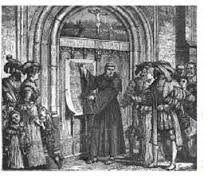Christianity began with Jesus. We could argue
that it began with Jesus’ mission on earth, or that it began at Pentecost when
the Spirit came to the apostles, but the fact remains that Christians are followers
of Christ. It started off as a small movement that grew exponentially. Roman
emperors tried to wipe it out in several waves of persecution, but early in the
fourth century, the emperor Constantine converted to Christianity and declared
it the official religion of Rome. According to some, this was the end of the
pure faith because the church became entwined with civil politics and
concessions were made to pagan traditions. Regardless, this did stop the
persecution of the Christians and allowed them a time of peace.
In the second century, Marcion proposed that the
God of the Old Testament was not the same God that Jesus called Father. In
fact, he proposed that the Old Testament be discarded and that only a few of
the New Testament books be accepted as Scripture. This caused a large amount of
debate and it pushed the church to decide upon a canon of Scripture or definition
of what writings make up the Bible. The New Testament canon as we know it
developed over a few hundred years of debate. By 400 A.D., the canon became
what it is today. The Council of Nicaea in 325 A.D. decided on a statement of
basic Christian doctrine, such as Jesus being both divine and the Son of God.
The Bishop of Rome became the most influential
Christian leader from that point onward. The Christian church gained power, but
also corruption and traditions not in the Bible. The eastern churches and the
western churches held different philosophies, and in 1054 AD Pope Leo IX
excommunicated the patriarch of Constantinople, the leader of the Eastern church.
The patriarch, in turn, spoke against Pope Leo IX, and the church was officially
divided into the Roman Catholic and the Eastern Orthodox segments.
In the 1400’s, a growing number of radical
thinkers saw the corruption in the church and wanted to do something to reform
the church. They wanted to strip away all the traditions and customs like
purgatory and the worship of saints, and return to the faith of the Bible. They
also began to translate the Bible in the languages of the common people. Some
of the more recognizable names are John Wycliffe, Jan Huss, John Calvin and Martin
Luther, who put his 95 Theses on the door of a university church in 1517,
sparking a wave of interest in Reformation.
If it weren’t for the Reformers organized
religion, at least in Europe and North America, would look very different
today. They gave birth to the Protestant church, organized religion based on
liberty of conscience and the provision of many choices of different kinds of
churches.
In the 1600s, Protestants and Catholics
established churches in North America and new concepts of religious freedom
emerged. The Protestant faith was continually changing as new revival preachers
took their stands on new doctrines. John Wesley founded the Methodists. John
Calvin established Presbyterianism and his follower, George Whitefield, arrived
in the New World colonies with very successful revival sermons. There were Baptists,
Lutherans, Quakers and Dutch Reformed. Since that time organized religion in
North America has continued to compete, create new denominations and merge
existing ones. It often behaves more like American business corporations than
the first Christian communities described in the Book of Acts.

No comments:
Post a Comment